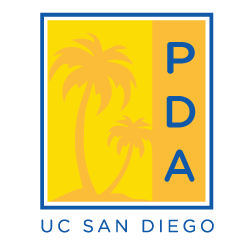
Christine Hochmuth, Ph.D.
Science and Technology Policy Fellow, Senate Committee on Transportation and Housing | California Council on Science And Technology (CCST)

- Interview Overview
Interview Overview
Interviews and Editing by: Alexandra Bortnick
Interview: September 2015
Transition: November 2014
1. Please list your previous department at UC San Diego and provide a brief description of the research you conducted?
Cellular and Molecular Medicine
As a post-doctoral fellow in the lab of David Traver, I used zebrafish to research how blood stem cells migrate from their site of emergence to where they take up residence in the adult organism.
2. Please describe your current job profile?
For the last year, my job has been with the Senate Committee on Transportation and Housing (as a part of the CCST Fellowship Program). The committee hears all bills in the legislature that are related to housing and transportation. The majority of the work is analyzing bills coming before the legislators of our committee. I communicate with all the authors and interest groups on each bill, analyze their intended and unintended consequences, research prior legislation and work with agency staff to understand the context and meaning of the bills. Additionally, the committee is responsible for conducting oversight on legislative mandates. An important role for committee staff is to function as subject matter experts for members of the legislature and their staff.
3. What made you decide to transition into your current position?
My transition was fueled by taking an inventory of the things I most enjoyed during the course of my scientific training. Scientific communication was high on the list. The feeling that my work had an impact was also important. I wanted to feel a sense of accomplishment at the end of every day. I also considered what sort of environment I wanted to work in. After careful consideration, I realized that I wanted to work in a fast-paced, team-oriented, challenging environment.
4. Apart from the research you conducted, do you feel like anything in particular has helped you acquire your current position?
Besides research, I really enjoy teaching. I have worked with high school outreach programs and youth programs at science museums. I have taught at the college level and also taken classes to become a more effective instructor. I worked on my scientific communication skills by reviewing papers and writing reviews of literature.
5. Please list some of the most striking similarities and differences between your postdoc and current position?
Similarities: Much like in academia, the standards for the work product in my new job are high. However, the amount of time to complete a project has considerably lessened.
6. Is there any specific challenge (during the entire process of transitioning) that you would like to highlight and, if so, how did you overcome it?
It is challenging, but fun, to deal with the amount of meetings. Sometimes your day is consumed with briefings, meetings, phone calls, hearings, and then at 5 when everything quiets down, you can get started on your 'to-do' list for the day. Also, no matter how much you prepare, unexpected events will arise, and you'll have to deal with them, on short notice with a tight deadline, while juggling 5 other things at the same time.
7. Please describe your goals and ambitions for the next 5 years?
My goal for the next five years is to learn as much as I can about public policy, fiscal policy, and the state budget so that I can gain important skills and open up even more career opportunities. I would like to work in the legislature, the Department of Finance (in charge of the budget for the State of California), and a State Agency or Department to understand the full cycle of making laws and how the laws must be implemented, all within the confines of the state budget.
8. What do you feel you could have done more, as a postdoc, to help prepare you for or acquire your current position?
I wish I had taken the micro-MBA course offered at UCSD. (I tried though!) I was fortunate that my training program understood that none of us fellows had a political background, and they spent an intensive three weeks preparing us for our fellowship placements. One thing you can never do enough of is network. Growing, maintaining, and nurturing your network is the best thing you can do for you career.
9. What do you feel is the most important advice you can give to a current UCSD postdoc in order for them to obtain a position such as yours?
Be confident. Understand what your transferable skills are and how they can translate into what prospective employers are looking for. Always advocate for yourself. Be grateful for opportunities, but don't forget to negotiate on your behalf. You're worth it.
